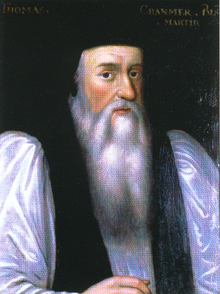
There had always been a healthy movement of dissent in England throughout the long period of the domination of the Church of Rome. Celtic Christianity did not easily submit and held out for several centuries. Traces of the Augustinian emphasis on grace could be found in figures such as Alfred and Bede, and Augustinianism was very strongly advocated by Thomas Bradwardine, Archbishop of Canterbury in 1349. The first credible movement back to biblical religion occurred with the ministry of John Wycliffe and the phenomenon of Lollardy, his band of followers that continued to adhere to a simple gospel until the advent of the Reformation. Wycliffe was England's first reformer, and in many ways a promoter of Continental reform through Jan Hus and his influence on Luther. Wycliffe was the man who began to steer the Ecclesia Anglicana back to the Word of God, Gospel, and Grace. His importance is variously estimated and discussed by modern historians but the foundation he helped to lay meant that the Reformation in England had native origins as well as external influences. An English Reformation occurred. There were strong stirrings for renewal before King Henry VIII encountered and began to handle his marital difficulties, to which his political manoeuvres gave greater impetus and eventual success. Among those engaged in the purification of the church was William Tyndale, seemingly affected by Wycliffe almost as much as Luther. The reformation of the church in England sprang from the Book of God, and the wave of Reformers contemporaneous with Tyndale, and successive to him (epitomised by Cranmer), were all profoundly Biblical men dedicated to the restoration of evangelical and apostolic Christianity. They had no other brief than to be loyal to Christ and his revelation in the Word of God.
Believingly, learnedly, humbly, and courageously, these men set about establishing the basis for a Biblical and godly community of faith in England. Their endeavours would alter forever the character of the Ecclesia Anglicana. The catholic (universal) church in the realm of England would be reformed, and the Word of God determinative in all things. The best of the ancient post-apostolic inheritance would be gratefully retained. The Church Fathers were carefully studied and their Scriptural teaching admired and passed on. The Ecumenical Creeds were conserved and declared as fundamental statements of belief. Cranmer, with all his theological, liturgical, and literary skill reworked the choicest elements of traditional piety for the benefit of the English people at worship, and with his colleagues produced a manual of doctrine and devotion in the Book of Common Prayer, that is nothing else but Scripture rearranged for corporate confession and the adoration of God. Anglicanism at the outset was simply Gospel Christianity for the English nation, not an artificial construct built from abstract dogma and speculation. It had come to the people gradually through a series of historical developments and the influence of great Christian thinkers concerned about right doctrine for the knowledge of God. The work of the Reformers was not complete. All their aspirations were not satisfied and many of their aims were retarded and frustrated by various forces and circumstances. For example Archbishop Cranmer never completed his revision of canon law. The objective of the Reformers, unified in Scripture, but each with individual insights and ideals in detail, was the establishment and preservation of a truly Christ-Centred church, boldly and clearly proclaiming the Lord Jesus in his Saviourhood and Lordship.
Anglicanism, then, shares and cherishes the heritage of the Reformed family of churches. It is Protestant and Evangelical by nature and at its core, in spite of Laudian manoeuvres in the 17th century, and Romanizing tendencies in the 19th. People speak of an Anglican spirituality or ambience, and they do so in a variety of ways, but to use “Bunyanesque” terminology, Anglicanism is purely and simply, at its heart, “Bibline”. Embellishments and trappings are associated with it in the public mind, some innocuous and perhaps helpful, but these are non-essential, superficial, accretions magnified out of all proportion in describing Anglicanism. Article 20 states that Anglicanism is not open “to prescribe anything contrary to Scripture, or to enforce anything not found in Scripture to be believed as necessary to salvation”. Indeed, it is one with all who seek to be loyal to Scripture and worship the Lord worthily. Its doctrinal “distinctives” in tone and nuance, actually merge with the “distinctives” of universal Biblical belief adhered to by the people of God everywhere. We may sum up Anglicanism as being Biblical, Liturgical, and Reformational. It was founded as the expression of Scriptural Christianity in the English kingdom of the 16th century. In spite of English style it is not a unique genus of faith or spirituality, but partner with all who love the Word of God to the advancement of the kingdom of Christ. The claim to be Anglican is not pride of denomination but perseverance in the Reformed Catholic Tradition. It is simply to acknowledge participation in the benefit of a work of divine grace that came to a culmination in the Ecclesia Anglicana at a specific time in its history, a work which continued with fluctuation until this day, and which, hopefully, will see a mighty resurgence in the future.
RJS

 RSS Feed
RSS Feed
